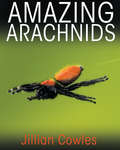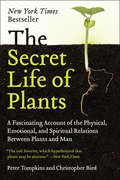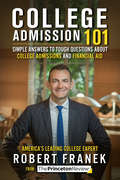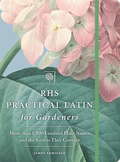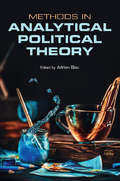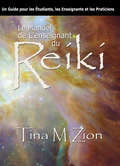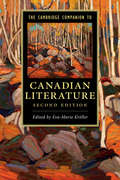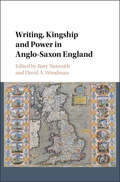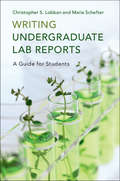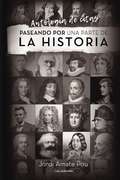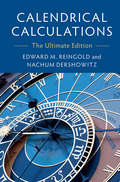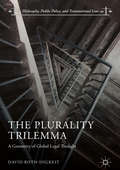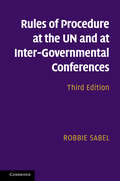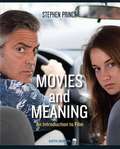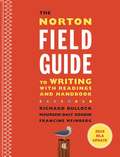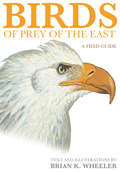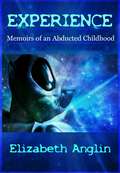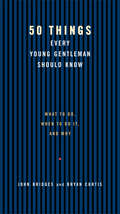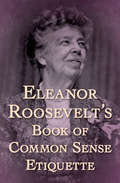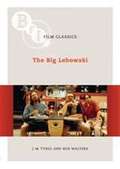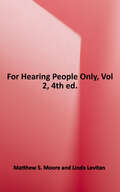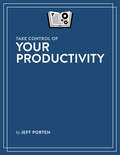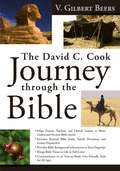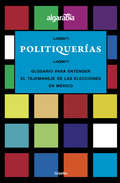- Table View
- List View
Amazing Arachnids
by Jillian CowlesA richly illustrated and up-close look at the secret lives of spiders and other arachnidsThe American Southwest is home to an extraordinary diversity of arachnids, from spitting spiders that squirt silk over their prey to scorpions that court one another with kissing and dancing. Amazing Arachnids presents these enigmatic creatures as you have never seen them before. Featuring a wealth of color photos of more than 300 different kinds of arachnids from eleven taxonomic orders--both rare and common species—this stunningly illustrated book reveals the secret lives of arachnids in breathtaking detail, including never-before-seen images of their underground behavior.Amazing Arachnids covers all aspects of arachnid biology, such as anatomy, sociality, mimicry, camouflage, and venoms. You will meet bolas spiders that lure their victims with fake moth pheromones, fishing spiders that woo their mates with silk-wrapped gifts, chivalrous cellar spiders, tiny mites, and massive tarantulas, as well as many others. Along the way, you will learn why arachnids are living fossils in some respects and nimble opportunists in others, and how natural selection has perfected their sensory structures, defense mechanisms, reproductive strategies, and hunting methods.Covers more than 300 different kinds of arachnids, including ones new to scienceFeatures more than 750 stunning color photosDescribes every aspect of arachnid biology, from physiology to biogeographyIllustrates courtship and mating, birth, maternal care, hunting, and defenseIncludes first-ever photos of the underground lives of schizomids and vinegaroonsProvides the first organized guide to macroscopic mites, including photos of living mites for easy reference
The Secret Life of Plants: A Fascinating Account of the Physical, Emotional, and Spiritual Relations Between Plants and Man
by Peter Tompkins Christopher BirdThe world of plants and its relation to mankind as revealed by the latest scientific discoveries. "Plenty of hard facts and astounding scientific and practical lore."--Newsweek
College Admission 101: Simple Answers to Tough Questions about College Admissions & Financial Aid (College Admissions Guides)
by Princeton Review Robert FranekThis friendly, helpful Q&A book from the editor-in-chief of The Princeton Review presents simple answers to your toughest questions about the college admissions process, figuring out financial aid, and getting into the university of your choice!As The Princeton Review’s chief expert on education, Robert Franek frequently appears on ABC, CBS, NBC, and FOX to share his insider expertise on the college admissions process. Each year, he travels to high schools across the country, advising thousands of anxious students and parents on how to turn their college hopes into reality. Now, with College Admission 101, the best of Rob’s wisdom has finally been collected in one place! From standardized tests to financial aid, Rob provides straightforward answers to 60+ of the questions he hears most often, including:· Should I take the ACT or SAT?· When should I start my college research?· How many schools should I apply to?· Will applying Early Decision or Early Action give me a leg up?· Which extracurricular activities do colleges want to see?· How does the financial aid process work?· What’s more important: GPA or test scores?
RHS Latin for Gardeners: More Than 1,500 Essential Plant Names And The Secrets They Contain
by The Royal Horticultural SocietyRHS Practical Latin for Gardeners is a unique guide to plant binomials based on the bestselling RHS Latin for Gardeners. It contains 1,500 of the most useful and most widespread Latin names, organized into thematic chapters including Colour, Size, Form and Habitat. Each chapter is further subdivided into smaller groups, such as large plants and small plants. This allows gardeners to make new connections and discoveries in a way standard alphabetical lists don't permit. 'Behind the Name' feature boxes further increase the book's practical value, and a wide range of botanical watercolours ensure that it is beautiful as well as functional. This book includes a definition and pronunciation guide for each word, as well as a 16-page alphabetical index, so that it can still be used as a conventional dictionary of Latin names. And its handy, pocket-sized format makes it the perfect gift.
Methods in Analytical Political Theory
by Adrian BlauThis is the first book to explain how to use key methods in analytical political theory. The methods discussed include contractualism, reflective equilibrium, positive political theory, thought experiments and ideological analysis. Many discussions of political theory methods describe and justify these methods with little or no discussion of their application, emphasizing 'what is' and 'why do' over 'how to'. This book covers all three. Each chapter explains what kinds of problems in political theory might require researchers to use a particular method, the basic principles behind the method being proposed, and an analysis of how to apply it, including concrete principles of good practice. The book thus summarizes methodological ideas, grouped in one place and made accessible to students, and it makes innovative contributions to research methods in analytical political theory.
Le Manuel de L'enseignant du Reiki: Un Guide pour les Étudiants, les Enseignants et les Practiciens
by Tina M. ZionLe Manuel de L'enseignant Reiki fixe les normes pour l'éducation et l'instruction du Reiki. Ce livre est conçu pour les étudiants, les praticiens et les professeurs. Il enrichira les classes que les professeurs actuels enseignent, et donnera au nouveau professeur la confiance et la fièreté lors de la toute première classe. Les praticiens auront une plus grande compréhension de la mise en pratique du Reiki, et de ce qui se passe vraiment lors d'une session. Vous n'aurez plus jamais de peur ni de soucis pour savoir comment enseigner une classe de Reiki, ou donner une harmonisation. Vous serez satisfait et vos élèves seront reconnaissants du riche contenu de vos classes. Le Manuel de l'Enseignant Reiki est un guide graduel et précis pour l'instruction des trois niveaux ou degrés de Reiki. Ce manuel et son format vous fournit: * Un manuel concis qui est facile à utiliser. * Une référence rapide pour répondre aux questions des étudiants. * Des étapes consécutives avec des estimations de temps, pour être sûr que vous enseigniez toutes les informations et ayez encore plein de temps à disposition pour les sessions pratiques. * Comment donner le plus possible à vos étudiants pendant leurs sessions pratiques. * Comment augmenter la puissance de vos harmonisations. * Comment enseigner l'harmonisation aux autres. * Les buts pour différentes parties de chaque classe. * Les descriptions détaillées et utilisations des symboles. * 15 polycopiés qui sont concis et informatifs, et qui peuvent être copiés de ce livre. * Des explications écrites et complètes pour chaque polycopié. * Une liste de fourniture pour chaque niveau et des suggestions pour l'atmosphère de votre classe. * Les grandes lignes pour ouvrir votre propre centre de pratique de Reiki. * Des informations en ce qui concerne l'obtention d'une licence d'état. * Comment éviter les problèmes avec les médecins et la communauté médicale.
The Cambridge Companion to Canadian Literature (Cambridge Companions to Literature)
by Kröller Eva-MarieThis book offers a comprehensive and lively introduction to major writers, genres and topics in Canadian literature. Addressing traditional assumptions and current issues, contributors pay attention to the social, political and economic developments that have informed literary events. Broad surveys of fiction, drama, and poetry are complemented by chapters on Aboriginal writing, autobiography, literary criticism, writing by women, and the emergence of urban writing in a country historically defined by its regions. Also discussed are genres that have a special place in Canadian literature, such as nature-writing, exploration and travel-writing, and short fiction. Athough the emphasis is on literature in English, a substantial chapter on francophone writing is included.
Writing, Kingship and Power in Anglo-Saxon England
by David A. Rory Naismith WoodmanThe workings of royal and ecclesiastical authority in Anglo-Saxon England can only be understood on the basis of direct engagement with original texts and material artefacts. This book, written by leading experts, brings together new research that represents the best of the current scholarship on the nexus between authority and written sources from Anglo-Saxon England. Ranging from the seventh to the eleventh century, the chapters in this volume offer fresh approaches to a wide range of linguistic, historical, legal, diplomatic and palaeographical evidence. Central themes include the formation of power in early Anglo-Saxon kingdoms during the age of Bede (d. 735) and Offa of Mercia (757-96), authority and its articulation in the century from Edgar (959-75) to 1066, and the significance of books and texts in expressing power across the period. Writing, Kingship and Power in Anglo-Saxon England represents a critical resource for students and scholars alike with an interest in early medieval history from political, institutional and cultural perspectives.
Writing Undergraduate Lab Reports: A Guide for Students
by Lobban Christopher S. María SchefterWriting clear, impactful reports is a crucial skill for science students, but few books focus on this area for the undergraduate. Particularly useful for biology students, this text adopts a hands-on approach, using example reports and published papers as models to put guidance into practice. An introductory chapter familiarizes undergraduates with the principles of writing science. Two model reports are then developed, walking students through experimental and observational teaching-lab reports. The structure and content of the Introduction, Methods and Materials, Results, and Discussion are explained, together with tips for the title, abstract, and references. Students are then guided on how to polish their first draft. The last section of the book analyzes two published papers, helping the reader transition to reporting original research. Clearly and concisely written, this text offers a much-needed lifeline for science students facing science report-writing for the first time, and for those looking to hone their writing skills.
Paseando por una parte de la Historia: Antología de citas
by Jordi Amate PouEste libro es una puerta abierta al pensamiento de grandes personas que con su juicio y talento modificaron el mundo que les tocó vivir. <p><p>Este libro es una recopilación de las mejores citas expresadas a lo largo de casi mil años de Historia, a través de ideas y experiencias de diversas personalidades de diferentes culturas. <p><p>Con estas casi ochocientas páginas (que por orden alfabético recogen el pensamiento de cuatrocientos treinta y siete personajes conocidos, con un total de más de trece mil citas literarias), el autor pretende mostrar que una opinión, frase o cita popular pueden esconder todo el conocimiento y el ingenio de la ocurrencia más sugestiva. <p><p>Además de descubrir miles de perlas de sabiduría de todos los tiempos, puedes aprender diversas curiosidades relacionadas con las celebridades a las que se hace referencia... Descúbrelas en su interior.
Calendrical Calculations (3rd Edition): The Ultimate Edition
by Edward M. Reingold Nachum DershowitzA valuable resource for working programmers, as well as a fount of useful algorithmic tools for computer scientists, this new edition of the popular calendars book expands the treatment of the previous edition to new calendar variants: generic cyclical calendars and astronomical lunar calendars as well as the Korean, Vietnamese, Aztec, and Tibetan calendars. The authors frame the calendars of the world in a completely algorithmic form, allowing easy conversion among these calendars and the determination of secular and religious holidays. LISP code for all the algorithms are available on the Web.<P><P> Has general appeal across computer science and beyond LISP code available on the web site.<P> Now includes generic cyclical calendars and astronomical lunar calendars as well as the Korean, Vietnamese, Aztec, and Tibetan calendars.
The Plurality Trilemma
by David Roth-IsigkeitThis book provides a comprehensive introduction to global legal thought. It argues that economic globalization and digitalization have induced significant insecurity about the future of human social organization. While traditional international law as a system based on the consent of national states is in the process of rapid adaptation to its new social preconditions, a variety of transnational regulatory levels compete for legal authority. In this process of change, there is more need than ever to guide the theoretical understanding because academic concepts have a crucial influence on the emerging practice of global law. This book highlights which choices are available and argues that global law requires taking a stand in mutually irreconcilable choices.
Rules of Procedure at The UN and at Inter-Governmental Conferences (3rd Edition): A Study Of The Rules Of Procedure At The Un And At Inter-governmental Conferences
by Robbie SabelThis new edition is a comprehensive manual of the rules of procedure for the conduct of business at the UN General Assembly, at international conferences and at assemblies of inter-governmental organisations such as the IAEA, ICAO, ILO, IMO and WHO. It examines the legal basis of these rules, the history of their development and the attempts at their codification. At the heart of this book is an examination of the practical applications of rules of procedure. Sabel also considers whether certain procedural rules and applications have become so well established that they have now attained the status of customary international law. This book is of interest to those involved in international law, international relations and international organisations. It also serves as a practical manual for delegates to the UN General Assembly and to international conferences.
Movies And Meaning (Sixth Edition): A Introduction to Film
by Stephen R. Prince<P>Movies and Meaning focuses on narrative filmmaking, and on fictional narratives in particular, because this is the most popular and pervasive form of filmmaking,<P> seen by the largest audiences, and what most people mean when they talk about "the movies."<P> Throughout the text, boxes extend the major topics of discussion into more specialized areas and supplement film examples with brief profiles of major directors.
The Norton Field Guide to Writing: With Readings and Handbook
by Richard Bullock Francine Weinberg Maureen Daly Goggin<P>The Norton Field Guide to Writing began as an attempt to offer the kind of writing guides found in the best rhetorics in a format as user-friendly as the best handbooks, and on top of that, to be as brief as could be. <P>We wanted to create a handy guide to help college students with all their written work.
Birds of Prey of the East: A Field Guide
by Brian K. WheelerBirds of Prey of the East and its companion volume, Birds of Prey of the West, are the most comprehensive and authoritative field guides to North American birds of prey ever published. Written and lavishly illustrated with stunning, lifelike paintings by leading field-guide illustrator, photographer, and author Brian Wheeler, the guides depict an enormous range of variations of age, sex, color, and plumage, and feature a significant amount of plumage data that has never been published before. The painted figures illustrate plumage and species comparisons in a classic field-guide layout. Each species is shown in the same posture and from the same viewpoint, which further assists comparisons. Facing-page text includes quick-reference identification points and brief natural history accounts that incorporate the latest information. The range maps are exceptionally accurate and much larger than those in other guides. They plot the most up-to-date distribution information for each species and include the location of cities for more accurate reference. Finally, the guides feature color habitat photographs next to the maps. The result sets a new standard for guides to North America's birds of prey.Lavishly illustrated with stunning, lifelike paintingsWritten and illustrated by a leading authority on North American birds of preyDepicts more plumages than any other guideConcise facing-page text includes quick-reference identification pointsClassic field-guide layout makes comparing species easyLarge, accurate range maps include up-to-date distribution informationUnique color habitat photographs next to the maps
Experience: Memoirs Of An Abducted Childhood
by Elizabeth Anglin D. J. Carruthers D. CartwrightAliens abduct children. <P><P>In this memoir, Elizabeth Anglin recounts childhood and young adult memories of alien abduction and related paranormal experiences that pre-date her being one of the first abduction experiencers to work with Dr. John E. Mack, a Harvard Medical School Professor of Psychiatry, to recover specific abduction memories through hypnotic regression. <P><P>This first book in a series of three is a gripping tale of how alien abductions and associated paranormal events occurring from early childhood through young adulthood are remembered, misremembered, misunderstood and processed within an
50 Things Every Young Gentleman Should Know: What to Do, When to Do It, and Why
by Bryan Curtis John BridgesWith sales of more than 750,000 copies, the books in the GentleManners series have become the most popular gift etiquette books on the market today. This latest book in the series was written especially for boys ages 8-14, to teach them the basic skills every young man should have and every young man's mother and grandmother want him to have. Among the topics covered in this book are how to shake hands, how to make an introduction, what to do when you sneeze or cough, and how to use a napkin. It is written in a style that will appeal to young men of that age.
Eleanor Roosevelt's Book of Common Sense Etiquette
by Eleanor RooseveltIn an era of incivility, discover a timeless guide to good manners from First Lady Eleanor Roosevelt. “The basis of all good human behavior is kindness,” says Eleanor Roosevelt in this classic handbook, first published in 1962 as a “modern book of etiquette for modern Americans.” As a politician, diplomat, and activist, as well as the longest-serving First Lady of the United States, Mrs. Roosevelt knew that thoughtful, civil behavior was essential to peaceful, productive relationships. In this etiquette guide, she teaches that decorum is not about strict adherence to formal rules; it is about approaching all social situations with consideration for others. She advises, “If ever you find yourself in a situation in which following a formal rule would be manifestly unkind, forget it, and be kind instead.” Drawing from her personal and professional experiences, Roosevelt covers a broad range of topics, including business dealings and family affairs, writing letters and receiving guests, and entertaining at home and traveling abroad. Beginning with the necessity of good manners between husband and wife, she considers the importance of courtesy in society at large and the role all Americans play as ambassadors of democracy while visiting foreign countries. In an era of incivility, Eleanor Roosevelt’s Book of Common Sense Etiquette is more relevant than ever. This ebook has been professionally proofread to ensure accuracy and readability on all devices.
The Big Lebowski (Bfi Film Classics Ser.)
by J. M. Tyree Ben Walters<P>Since its release nearly ten years ago, The Big Lebowski has become a cult classic with a worldwide following, having survived the baffled reaction of many mainstream critics.<P> Its fans tend to be fanatical, congregating at 'Lebowski Conventions' in bowling alleys across American and Britain, and even dressing up as characters from the film. <P>Among the funniest films of the last twenty-five years, and one of the high-water marks of 1990s genre recycling and pastiche, The Big Lebowski also littered with playful and subversive references to film history, especially to Raymond Chandler's world of hardboiled detective classics and the world of film noir.<P> The Big Lebowskiis the rarest kind of film, a comedy whose jokes become funnier with repetition. The same goes for its multitudinous jukebox-like references to other films, many of which open up vistas for intertextual interpretation.<P> Underneath the film's breakneck pacing and foul-mouthed characters, a farcical collection of flakes, losers, and phonies, is a surprisingly humane account of what fools we mortals be. <P>It is one of the oddest buddy films ever made, with extraordinary performances by Jeff Bridges and John Goodman.<P> In this study, The Big Lebowskiis set into the context of 1990s Hollywood cinema, anatomised for its witty relationship with the classics which it satirises, and discussed in terms of its key theme: the hopeless flailing of ridiculously unmanly men in the world of discombobulated, mixed-up, or put-on identities that is Los Angeles.
For Hearing People Only (4th Edition): Vol. 1
by Matthew S. Moore Linda Levitan<p>In a handy question-and-answer format, <i>For Hearing People Only</i> addresses some of the most commonly asked questions about deaf people, their community and their language. The 4th edition has been expanded into two volumes—containing more content than ever! The <i>For Hearing People Only</i> 4th Edition is almost double the size as the previous edition! That means more questions, more answers and more content. It has been expanded into two volumes, and reflects changes in technology and telecommunications. <p>Concise, easy-to-read and designed for those with no prior background, <i>For Hearing People Only</i> makes a formidably complex subject accessible. Each chapter can be read as an independent unit. This is the first book of its kind—written especially for laypeople who are curious about deaf people, and would like to separate truth from stereotype, fact from misconception, reality from myth. <i>For Hearing People Only</i> makes a good introductory or supplemental text for Deaf studies or signing and interpreter students.
Take Control of Your Productivity
by Jeff PortenIncrease Productivity and Reduce Stress!Being productive is never as simple as putting items on a calendar or to do list and checking them off. Most of us struggle with too much to do, too little time, and only a vague idea of how to plan each day so we can achieve the best results with the least stress. If that sounds like you (and especially if you've tried a bunch of productivity systems and found them lacking), Jeff Porten's expert guidance may be just what you need.As a professional technology consultant and an early adopter of both hardware and software, Jeff has tried nearly every productivity management system out there, and experimented with dozens of implementation styles. He brings his decades of experience to this book, helping you create a customized strategy that's ideal for your needs, and--crucially--avoid common mistakes. Whether you're a productivity junkie or someone who has struggled for years with a cobbled-together, informal task-management system, this book will help you get a much better grip on your personal and business time.In this book, you'll:Review the principles of successful planning--whether for immediate projects or for long-term and "someday" goals.Understand your natural working style and preferences, including comfortable habits that may not be productive but that you don't want to change, and create a more effective workflow that fits you.Discover the best ways to think about projects, tasks, events, due dates, flags, contexts, and more.Choose a task-management app that's appropriate for your needs, no matter what devices and operating systems you use, and that integrates with your calendar, reminders, notes, and the apps you use to actually do things.Develop a step-by-step process for tracking all your events and tasks and ensuring that everything happens in the right order.Transition from an old system to your new system without worrying that anything will fall through the cracks.Learn exactly how to keep track of all the things you need to remember throughout the day.Improve your time-estimation skills when planning how long future tasks and projects will take.Solve the problem of "10-minute tasks" that become all-day projects because they have a dozen things you discover you need to do first.Get better at managing other people (and their expectations of you).Review how well your productivity system has worked over time, using feedback loops and suggested best practices to continually improve your workflow.Fail successfully! If something goes wrong--from a derailing large project to a life-changing crisis--learn how to recover gracefully and improve your system the next time around.Know when and how to make changes to meet any new needs you have, and to ensure that what you do every Tuesday at 2 PM contributes to your overarching goals and most important roles in life.Although many of the examples in the book refer to Mac productivity tools, the advice is platform-neutral. The book contains tips applicable to any combination of operating systems, and a companion webpage provides additional details on apps running on Mac, Windows, iOS, Android, and the web.
The David C. Cook Journey through the Bible
by V. Gilbert BeersVictor Journey through the Bible moves through the Bible, story by story, with background information in word and picture for almost 250 important Bible stories. It provides a storehouse of authentic material relating to these favorite stories--including hundreds of drawings taken from objects or monuments of Bible times, photos of Bible lands today, archaeological discoveries, reconstructions, and colorful maps which show the Bible in action. <P><P>Altogether there are more than 700 illustrations. To make this treasury of materials useful to all, including children, the author has written the text in an easy-to-read style, with much emphasis on interest as well as information. Many of the stories included in this volume feature common themes, such as shepherds, money, costume, and warfare.
PTAEXAM: The Complete Study Guide (6th Edition)
by Scott M. GilesPtaexam: The Complete Study Guide is the most comprehensive resource available for the National Physical Therapy Examination (NPTE-PTA) and sets a new standard for review book excellence. This edition raises the bar further by introducing numerous innovative features that are described in detail in "What's New in This Edition?"
Politiquerías: Glosario para entender el tejemaneje de las elecciones en México
by AlgarabíaPásele, sin temor ni aficiones encarnadas, a dar un recorrido al estrambótico y singular mundo del voto y el votado. Cada sexenio durante época de elecciones, o incluso cada día, nos encontramos con que los políticos de nuestro país nos ofrecen una gran cantidad de términos que a veces no entendemos y en otras ocasiones permanecen grabados en lo más profundo de la memoria. Las páginas venideras están llenas de triquiñuelas y felonías, en las que encontrará divertimentos y acepciones -cada una con su ejemplo de la vida real- de actos frecuentes en nuestro complejo sistema democrático. También disfrutará de datos curiosos sobre nuestros expresidentes, mandamientos para el «buen político», citas literarias, de personajes famosos y del pueblo; en fin, un amplio panorama de colores y tonos para entender -si esto es posible- un poco más del toma y daca, el tejemaneje y el estira y afloje de las elecciones en nuestra gran nación. Pásele, sin temor ni aficiones encarnadas, a dar un recorrido al estrambótico y singular mundo del voto y el votado.
